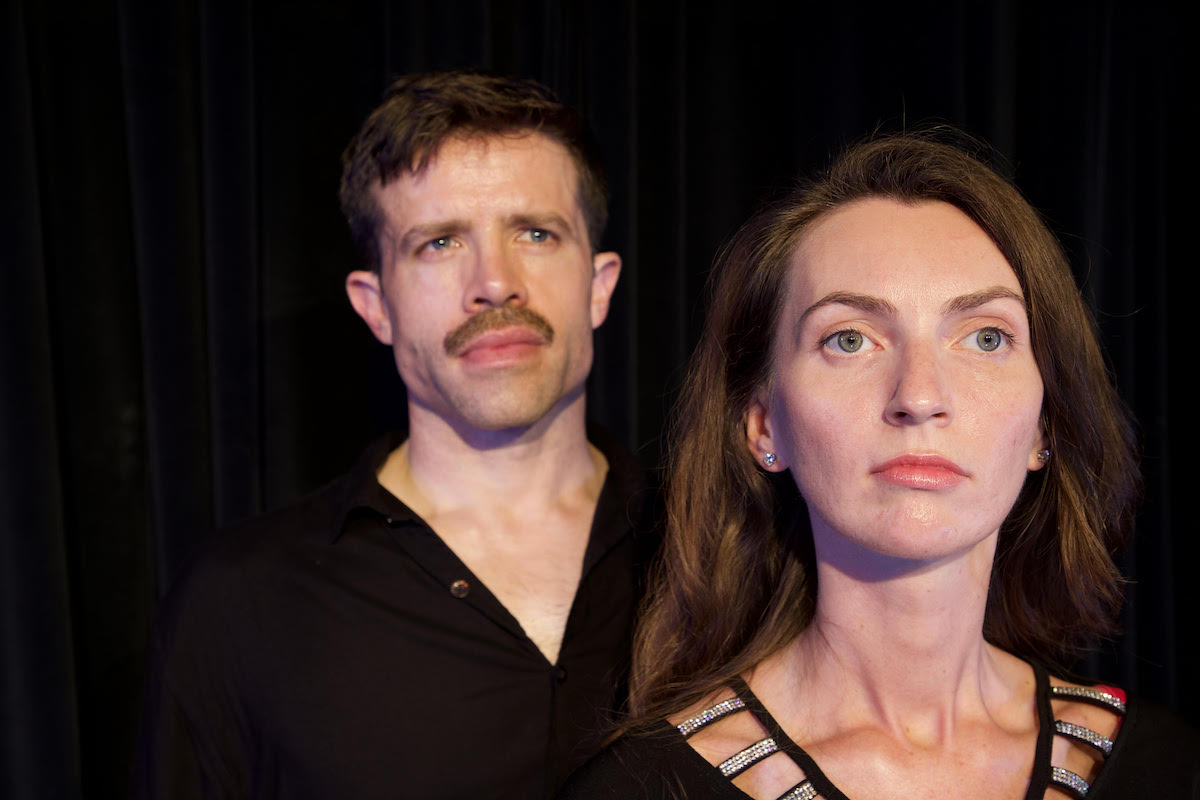Dijo el cuervo, “nunca más.”
That famous line of 19th century American poetry, “Quoth the Raven, Nevermore,” is a thread that runs through North & Sur, the new play being staged by Water People Theater.

North & Sur, a lyrical, magical story about two poets from different eras and cultures meeting “somewhere between being and nonbeing.” The play deserves to be a definitive point in the life of Water People Theater. Set in a series of three performance spaces at Instituto Cervantes, the play brings together two icons of literature—Edgar Allan Poe from North America and Alfonsina Storni from South America. The play, written by Oscar Perdomo Marin and directed by Iraida Tapias, is a delightful way for Water People Theater to project their mission of producing socially engaged bilingual and inclusive theater.
The story is introduced by Alfonsina (Kris Tori), an Argentine poet who lived in the early 20th century, with violinist J. Andres Robuschi. Alfonsina sings the opening passages as Robuschi accompanies her. Alfonsina tells us how she “submerged myself in the sea of the South, looking for the shell where I kept my dreams.” She transitions into a lilting version of Poe’s classic poem, “The “Raven,” noting the poem is about an anguished lover on the edge of madness over the loss of his love, Lenore. After one verse, it’s time for the audience to move to another space, this one a narrow book-lined study lighted by many candles.
There we find Edgar Allan Poe, recumbent and declaiming his iconic work, ending with “Take thy beak from out my heart, and take thy form from off my door!’ Quoth the Raven, ‘Nevermore.’”
The effect is beautiful and a little mysterious. And mystifying.
The entire play is bilingual. Alfonsina speaks mostly in Spanish and her words are projected in English. Poe speaks English and his words are projected in Spanish. That’s how we know this: Dijo el cuervo, “nunca más.”
The play is a lively conversation between two artists and director Tapias stages it simply, enabling the small audience (30 tickets per performance) to enjoy each scene and move easily to the next scene in a new space.
The dialogue is funny, argumentative and always poetic. Poe is at first confounded about where he is and who he’s with. “What are you? A sorceress? A fortune teller?” he asks,
The two poets converse about their work and differences in their times and cultures. Alfonsina informs him that she was a prize-winning poet in the South, in Argentina.
Poe: Ah, the south! I was never interested in life south of the Río Bravo.
Alfonsina: Indians, black people and white people. The beautiful interbreeding of the south!
Poe: I never liked that subject.

Later, Poe asks, “Why is there so much demanded of poets? Their position on politics, religion, philosophy, morals and yet they can’t even feed themselves with their verses.” (He tells us that the Evening Mirror paid him $9 for “The Raven” and it made him famous. In case you’re wondering, that $9 in 1845 would be worth $362 today.)
North & Sur is a play to be seen and heard. Oscar Perdomo Marin’s script is a lovely piece to read or see performed. Both Roberts and Tori give beautiful performances, making us believe in their characters’ meeting “somewhere between being and nonbeing.”
The staging in Instituto Cervantes’ three spaces is designed by Marisabel Muñoz with lighting by Karen Wallace. Choreography is by Jorge Niedas.
A note about seating. In the first space, there are a few seats but most audience members stand, The second and third spaces provide seats for the entire audience.
North & Sur continues through October 6 at Instituto Cervantes of Chicago, 31 W. Ohio St. Performances are at 7pm Wednesday-Friday. Tickets are $20-$30; buy them at www.waterpeople.org. The ticket includes a glass of wine from either North or Sur.
For more information on this and other plays, see theatreinchicago.com.
Did you enjoy this post and our coverage of Chicago’s arts scene and sometimes beyond? Please consider supporting Third Coast Review’s arts and culture coverage by making a donation by PayPal. Choose the amount that works best for you, and know how much we appreciate your support!
